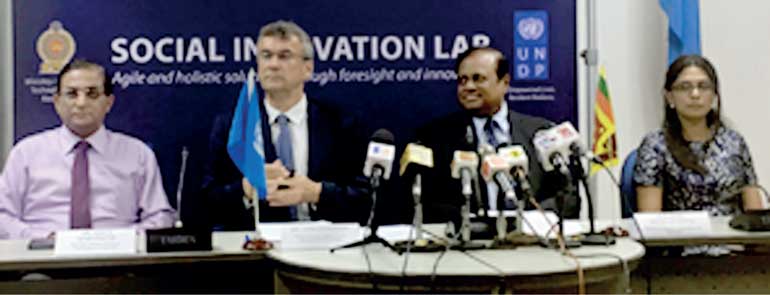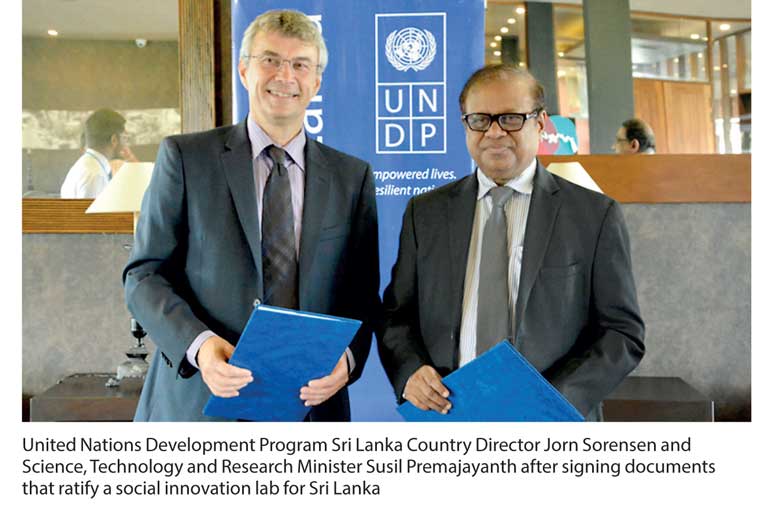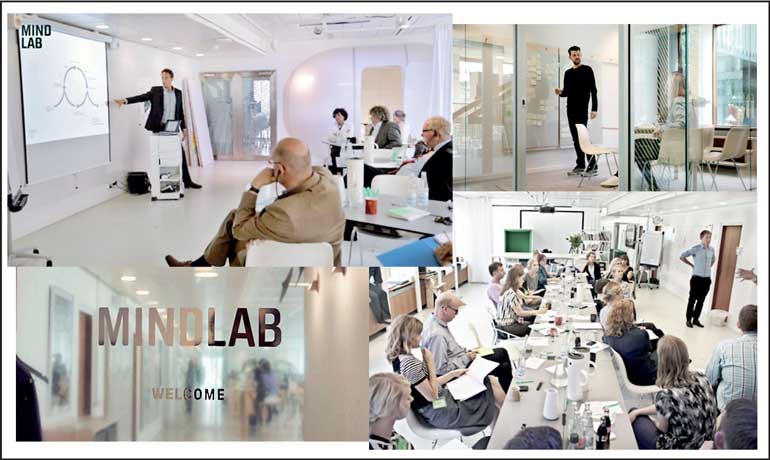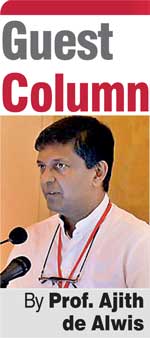Saturday Feb 21, 2026
Saturday Feb 21, 2026
Friday, 27 October 2017 00:00 - - {{hitsCtrl.values.hits}}


 When Science, Technology and Research Minister Susil Premajayanth and United Nations Development Program Sri Lanka Country Director Jorn Sorensen exchanged jointly signed documents at Waters Edge on Friday, 22 September, along with trading the associated pleasantries, the event heralded the birth of a regional first – the social innovation lab for Sri Lanka.
When Science, Technology and Research Minister Susil Premajayanth and United Nations Development Program Sri Lanka Country Director Jorn Sorensen exchanged jointly signed documents at Waters Edge on Friday, 22 September, along with trading the associated pleasantries, the event heralded the birth of a regional first – the social innovation lab for Sri Lanka.
The Social Innovation Lab – Sri Lanka was officially launched at a press conference, which was held on Monday, 25 September 2017 at the UN compound. The media was present and information was distributed and I hope Sri Lanka has noted this event as I am writing this almost a month after. The lack of awareness will only point to the knowledge transfer effectiveness in Sri Lanka based on the perceived importance of highlighting any type of news by our Fifth Estate.
Country Director Sorensen said: “The innovation brought about by the Sri Lankan lab is expected to be a driver of change and to encourage more critical thinking and close equality in Sri Lanka.”
The Sri Lankan lab is likely to be the 27th such lab in the world but from this region we will have the distinction of starting the first. Looking before leaping is an often-used comment but in Sri Lanka it is mentioned usually after taking the plunge and when the situation has worsened afterwards. Superb Sense in hindsight is unfortunately quite frequent.
On May 2016, a few organisations – both public and private – with the leadership of UNDP Sri Lanka and the Ministry of National Policies and Economic Affairs staged the National Conference on Foresight and Innovation.
One declared resolution at the end of the two-day event was to establish a Policy Innovation Lab which will look at policies and issues with foresight tools in place. One can say the approach will really benefit decision-making as we have not seen in general, consistent and progressive data-driven and evidence-based decision-making in our environment. Even good ideas have failed after following an implementation pathway which is flawed.
No one can be happy with situations where you roll out directives in the morning and by evening you are looking at retrieval or revisal after plenty of discontent and discord at the ground level.
What if one can test your ideas in a simulator with the participation of stakeholder representatives? What if I see my idea supported or opposed, backed by data, and then I suitably modify my approach but execute it with much more confidence and with due sensitivity. Those were the types of situations that were to be enabled via rapid prototyping by the innovation lab established, connected to the Government. Work on realising the objectives continued over a year and the event at Waters Edge last month was a culmination of all the necessary preliminaries.
The UNDP has been instrumental in driving the establishment of labs of this nature in quite a few countries. Mindlab of Denmark comes to the mind along with the Pulse Lab of Jakarta, Indonesia.
The understanding for this program comes from knowing the value of foresight and that the labs are vehicles for bringing foresight into play in economic and social planning. In the interim period, from resolution to implementation, the Pulse Lab team actually visited Sri Lanka and carried out a landscape survey, which enabled better planning. This process culminated with the recommendation that the Policy Innovation Lab concept be transformed into a Social Innovation Lab and the base of the lab be at the Ministry of Science, Technology and Research.
I am quite happy to record the active engagement of the Coordinating Secretariat for Science, Technology and Innovation (COSTI), which is with the Ministry of Science, Technology and Research in this process.
Definitely the establishment of a lab of this nature is a more formalised process for ensuring that an evaluatory mechanism is enabled in the public machination. The foresight concept is not new and today is deployed in both private and public systems across the world by those with some foresight to start with.
One should remember how the scenario analysis, which is a foresight tool, enabled Shell to understand the impending 1973 oil crisis which changed the global economy rather dramatically and was positive for Shell.
Now this is quite a famous example. Consider the Mindlab, which consist of around 20 people engaging in so many areas providing answers after evaluating multiple alternative scenarios. Being a cross-governmental innovation unit, it involves citizens and businesses in developing new solutions for the public sector.
A limited number of personnel will be present in the lab and there will definitely be data scientists among them. As per Thomas Prehn of Mindlab in Denmark: “A lab should really be focused on how to change the way a public sector works,” explains Prehn. “The most important task for public service innovators should be to disseminate the way they work through an organisation, and then the organisations will, in some cases at least, be more innovative, agile and adaptive as a result.” We must also remember that the Sri Lankan Government is Sri Lanka’s largest employer.
Our public sector may be a world record-holder in terms of numbers – breadth and width, etc. All of us readily agree that this machine is slow to respond and slow in delivery. Agility is not something we can speak much of and similarly public sector innovation is almost unheard of.
If a cross-governmental discussion can be made over programs and service innovation is embraced as a need of the hour, the lab can go a long way in supporting transformation and surely it is then a win-win program.
It is important that the lab is seen to start delivering early. This aspect has been given attention in the planning  document. In the months following the creation of the lab, it is imperative to undertake a series of activities that demonstrate the capabilities of the lab via quick wins, thereby providing the lab with proof-of-concepts to appeal to stakeholders, to move on to other engagements and more ambitious projects.
document. In the months following the creation of the lab, it is imperative to undertake a series of activities that demonstrate the capabilities of the lab via quick wins, thereby providing the lab with proof-of-concepts to appeal to stakeholders, to move on to other engagements and more ambitious projects.
The concept of policymaking behind closed doors too will be dispelled hopefully where much more citizen engagement will take place in analysing policy options. One question raised by the press in the meeting regarded solid waste.
I think one can think of many a need – how can we fill university places with speed without allowing spaces to exist due to the inability to fill them on time, how can we eliminate the waiting time and ensure our students graduate one year earlier to the current norm, how can we have both Western medicine and Indigenous medicine both serving people at the same location, etc. There are so many possibilities for high-impact yet low-hanging fruits for consideration. However, a must initially is the interest to engage and develop the cross-governmental platform. This type of support to a country is always to be appreciated. This reminds one of the statement about teaching someone how to fish rather than providing just a meal. The persistence of the young UNDP team, led by Fadhil with Yasas and Deshani, is to be really appreciated. They never gave up.
The Ministry of Science Technology and Research, with Udaya Senevirathne as the Secretary, also supported the journey in all ways possible. Now an innovative mechanism has been created where one can plan a destiny better and differently.
It is not a big idea – I do not think this can be claimed as Sri Lanka’s next Big Idea - but a very important one. Time will tell when Sri Lanka too can boast of true public sector innovation with clear timelines known in advance and the probability of successful action guaranteed. We have burial grounds for policy due to a lack of executioners or those that met with many a Waterloo due to execution sans thinking. When the lab finally materialises at the grounds of the Industrial Technology Institute – which will happen quickly as all hands are ready to move on – the footfalls at the site may hopefully make some permanent footprints with a defined direction in the history of our progress.